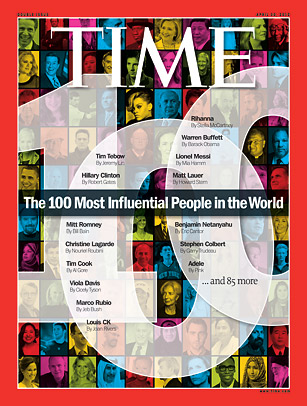
The nature of influence changes. The word originates from the medieval idea that a magical liquid emanates from the stars to influence our actions on earth. Modern influence often comes from the magical ability of technology and social media to overcome time and distance and reorder our perceptions. Before microphones and television were invented, a leader had to stand in front of a crowd and bellow. Now she can tweet a phrase that reaches millions in a flash. Influence was never easier — or more ephemeral.
Which is why we try to choose those people whose influence is both lasting and, with a few notable exceptions, laudable. The economist Elinor Ostrom, who is on our list this year, has written about the tragedy of the commons, which is the idea that self-interest can undermine the common good. We look for the antidote to this: how individuals can start a chain reaction of virtue, shaping events in ways that can become both viral and enduring.
We are living in a transformative period in which leadership and influence emerge in unlikely places. Manal al-Sharif posted on YouTube a video of herself driving in Saudi Arabia — women are barred from driving in the kingdom — and was jailed for nine days. Our categories — Breakouts, Pioneers, Moguls, Leaders and Icons — reflect the different types of influence demonstrated by people on the list. We look for those whose influence is at a tipping point. In Russia, Alexei Navalny is harnessing the growth of Internet use to connect protesters via blogging. While there are new types of influence, some are as old as Adam. In Egypt, Samira Ibrahim demonstrated old-fashioned courage by standing up to the military in a court of law over forced "virginity tests."
This year, as in the past two, the most influential person in putting together the TIME 100 list was executive editor Radhika Jones, who edited the issue with her characteristic devotion to both breadth and depth. Managing the thousands of details that this entails fell to associate editor Feifei Sun. The fresh, inventive design was the handiwork of senior art director April Bell.
Statistician Hans Rosling made this year's list not only because of his years on the front lines of public health in Africa but also because of how he uses statistics to change people's perceptions of the world. "I am not an optimist," Rosling says. He describes himself instead as a "possibilist." The TIME 100 list is about the infinite possibilities of influence and the power of influence to change the world.